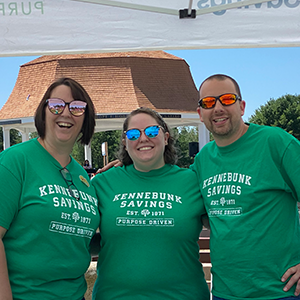Jump to:
We’ll help you create a policy that’s right for your business
Our business insurance products give you plenty of options when you’re looking for the right coverage to protect your business and assets. Our professional agents want to learn about your business and work with you to protect it. Coverage options include:
- Commercial Property – Protect your assets such as buildings, equipment, inventory, and fixtures. Even your customers’ property under your control could be covered.
- Auto/Fleet Coverage Protection for your commercial vehicles and equipment that are driven on public roadways. This could include vehicles you rent as well.
- Liability and Umbrella – Covers your premises, operations, and product and services, as well as umbrella policies that provide an extra layer of protection for your business.
- Professional Liability for Business Owners – Consider this coverage if you have a business that offers a professional opinion or guidance to your clients. Some businesses include architects, accountants, personal trainers and marketing firms.
To learn more about our Small and Commercial Business Insurance options, please contact us today at 1-800-794-2941. We look forward to speaking with you!
KSI has had me covered both personally and in business for over 17 years. They understand the industry, their products and the objective of their profession well. Having a company you trust in making the right risk assessments and coverage decisions is invaluable when the unexpected happens. I would not do business without KSI at my back. Thomas J. Allen President, Kittery Point Yacht Yard

Business Insurance FAQs
I’m just getting my business started. Should I get insurance right away?
Yes. You want to be ready for anything from day one, and that includes any potential loss. As your neighbor in the community, we want to be able to help you if a covered loss happens. But if you don’t have coverage, you could be facing the financial loss on your own.
Some of your customers might also request proof of your insurance. If you rent space for example, your landlord will probably request proof of insurance.
I don’t have any major business assets. Why should I have insurance?
What if the product or service you offer causes someone bodily injury or property damage? Would you be willing to pay these damages out of pocket? If the answer is no, insurance could be the solution to provide some protection for you.
Your business is valuable to you and it needs protection just like your home or auto. It could also be your source of income. What happens if you lose it? Consider two types of insurance: property and liability. Property insurance covers damage to your business assets; and liability insurance covers your business from claims that may cause bodily injury or property damage to others.. Working with one of our professional agents will help you build a comprehensive policy that protects you and your assets.
How do I decide on the type of property insurance to buy?
It depends on your business, its value, and the type of property you want covered. Here are a few steps we suggest you follow to understand what you might need:
- Take a complete inventory of all your business property.
- Determine all of its value based on replacing it new today.
- Decide items you want insured and what you might be comfortable not insuring.
- Have a conversation with one of our insurance professionals to help guide you through the different types of policies and coverages available to meet your needs.
Next, consider your business situation:
- Are you planning a major expansion?
- Does your inventory have a peak season (like a toy store in December)?
- Does it fluctuate throughout the year (like a clothing store)?
- Does your liability limit meet the requirements of the new contract you just signed?
Business policies can be adjusted based on your needs. One of our agents can help you as your business changes to ensure your policy continues to provide adequate coverage.
What are some examples of business property coverage other than my building and inventory?
Boiler and Machinery Insurance – You might need this coverage even if you don’t own a boiler. This insurance provides coverage against the sudden and accidental breakdown of various machinery and equipment, including boilers, computer systems, and telephones, and other communication systems. Coverage usually entails reimbursement for property damage, expedited expenses (like transportation charges), and business interruption losses.
Builder’s Risk Coverage includes buildings under construction. Coverage can be for either renovations or brand new construction.
Building Ordinance Coverage – In some communities, ordinances require buildings with a specified amount of damage must be completely demolished and rebuilt per current building codes rather than repaired.
Business Interruption Insurance covers the loss of profits as a result of damage or loss of business property. You can receive reimbursement for salaries, taxes, rents and other expenses plus net profits that would have been earned during the period of interruption can be included.
Debris Removal Coverage – In the event of a fire or other damaging event, this covers the cost of removing debris before reconstruction.
Glass Coverage – When store windows and plate glass on office fronts break, there’s no need to worry.
Inland Marine Insurance primarily covers property in transit. For example, you’re covered if you’re transporting goods to a warehouse or a retail store or if other people leave their property on your premises, such as clothes left at a dry cleaning business or an employee’s personal property left in the company locker room.
How much property insurance should I buy?
Each business is different. Check with a Kennebunk Savings Insurance agent and they will be able to help you determine what may be appropriate. A one-person accounting firm requires less insurance than a store with a substantial inventory. But the core needs are usually the same: coverage of business property, sufficient limits of liability that protect the owner and the employees and protection for lost income during a covered claim.
Unique circumstances might vary. For example, a store in a flood-prone area should invest in flood insurance. An accountant at that store might want reconstruction-of-accounts-receivable insurance to cover the loss of accounting records.
Who decides how much my business property is worth?
You can purchase property insurance based on the property’s actual value, replacement cost, or agreed amount. Here are the differences:
Actual Cash Value
The replacement cost of the item minus depreciation. For example, a new desk may cost $3,500. If your 7-year-old desk is damaged in a fire, it might have depreciated 50%. Insurance would pay you $1,750 minus any deductible you might have.
Replacement Coverage
Pays the cost of replacing an item without deducting for depreciation. So, today’s price for a desk of a size and construction similar to the 7-year-old one damaged by fire would determine the amount of compensation. If it costs $3,500 today, that would be the replacement coverage. Keep in mind; you pay any deductible that might apply.
Agreed Amount
You can insure art objects, antiques, and other unique items at an agreed-upon amount. As the business owner, you, the agent and the insurance carrier agree upon an amount to insure the goods for.
Check your policy. If you prefer replacement coverage and don’t already have it, you may be able to add this coverage to your policy. Inflation-guard coverage, which automatically increases your insurance amount by a certain percentage, helps protect against rising construction costs. One of our agents can work with you to determine what might be appropriate for you.
What kinds of events does business property insurance cover?
Basic property insurance policies generally cover:
- Losses caused by fire or lightning
- The cost of removing property to protect it from further damage
- “Extended perils” windstorm, hail, explosion, riot and civil unrest
- Damage caused by aircraft, automobiles, or vandalism
Should I protect my employees in the event of an injury on the job?
Yes. Most states have legal requirements you must follow regarding workers’ compensation. This coverage provides medical care and lost wages to employees who are injured on the job.
I just signed a 3-year lease to open my business. Why does my insurance agent want to see my lease?
Can I do anything to lower my insurance premiums?
Insurance premiums are based on risk. There are steps you can take to help reduce the risk, which may lead to lowering insurance premiums.
Consider these areas:
- Maintain adequate lighting throughout your business premises.
- Keep electrical wiring, stairways, carpeting, flooring, elevators, and escalators in good repair.
- Install a sprinkler system, smoke and fire alarms, and a security system.
- Make sure your employees have good driving records.
- Ensure your employees know how to lift correctly and use all necessary safety equipment, such as goggles, gloves and respirators.
A risk manager can also advise you of any safety or environmental improvements that might qualify you for a discount. You could also raise your deductibles where appropriate to lower your insurance premiums.
Let’s talk about the right business insurance
You can request a quote now or give us a call to discuss your options at 207-985-2941.
